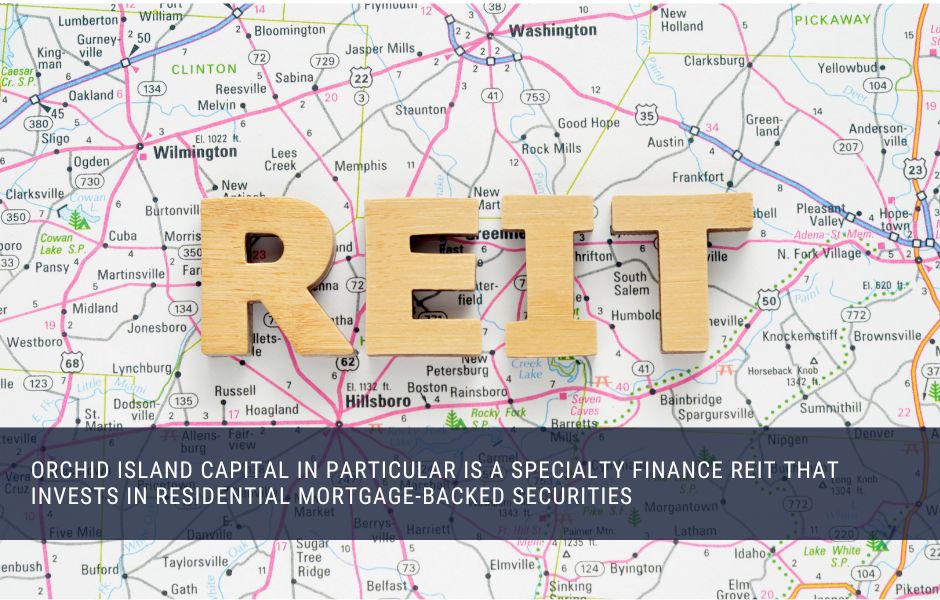Monthly Income Stock Focus: Orchid Island Capital
With almost 20% p.a. yields, this mortgage REIT might look attractive for investors seeking the best opportunities for monthly income, but not all is as it seems

David Garner
Monthly Income Stock Focus: Orchid Island Capital
If you are investing for monthly income, then you’ll already be familiar with REITs.
The model of owning real estate, leasing to tenants, and distributing the rental income as dividends is a familiar one, and these stocks often form the backbone of portfolios focused on generating regular, consistent, monthly income.
But there is another type of REIT to consider, too. One that – on face value at least – might seem perfectly well aligned with the current environment of rising interest rates.
Mortgage REITs don’t own physical real estate, rather, they own the mortgage notes attached to them. While they often pay much higher dividends that standard ‘property owning’ REITs, that doesn’t necessarily make them a better investment, and here’s why…
Take Orchid Island Capital (ORC) for example. ORC is a mortgage REIT that currently pays an exceptionally high dividend. In fact, the current dividend distribution equates to an annual yield of just about 20%! The company also pays its shareholders monthly, making it one of the highest paying monthly dividend stocks available right now.
But if something sounds too good to be true, well, you know the rest…
Despite rising interest rates, the prospects for mortgage REITs are not particularly great right now, and the dividend yield currently being paid by Orchid Island might not be sustainable, even though management has slashed dividend payouts a number of times already in recent years.
So, let’s take a deeper dive into this monthly income investor’s favorite, and look at some of the reasons you may be better avoiding it right now, as well as some of the alternative investments that may be better positioned to align your monthly income stream with rising interest rates.
Business Overview
As I already mentioned, mortgage REITs don’t own physical properties, rather, they own mortgages. Orchid island Capital in particular is a specialty finance REIT that invests in residential mortgage-backed securities (RMBSs).
An RMBS is simple an entity that holds mortgage notes and collects cashflow in the form of interest and principal payments from borrowers. An RMBS holds a pool of loans, which could include prime and subprime mortgages and home equity loans.

Those of us with a few years under our investing belts will remember the financial carnage of 2008. Proof beyond any doubt that these kinds of securitized mortgage note investments can be risky and volatile, especially if the underlying mortgage loans have suffered poor underwriting.
That said, mortgage REITs did pretty well in the aftermath of the global financial crisis as interest rates started to fall.
Future Prospects
Typically, mortgage REITs turn a profit by borrowing money at short-term rates, and lending at long-term rates. The difference (or spread) between the two is their profit.
When the spread between short and long-term rates narrows, this arbitrage investment strategy becomes less profitable.
This is precisely why mortgage REITs can be risky and volatile when short-term interest rates are on the rise – like now for example!
Then add to this the is the fact that short-term bond yields have risen to the point they offer a higher yield than long-term bonds. This is known as an inverted yield curve and is one of the most reliable indicators of a coming recession.
As a result of all this, the price of ORC stock has crashed 54% so far this year.
In fact, the share price has fallen so deeply that the company exchanged 1 share for every 5 outstanding – known as a reverse stock split – in August this year.

The company hasn’t been particularly successful in recent years, either. It’s track record is sketchy at best.
They have suffered multiple years of just about breakeven performance, couple with a couple of years of heavy losses in 2013 and 2018.
This begs the question… if Orchid Island can’t perform when interest rates are near zero, how well can it possibly fare when rates are much higher, and likely to continue to rise?
Well, the current financials tell us that the picture doesn’t look so great…
Orchid reported a Net loss of $84.5 million, or $2.40 per share in their Q3 results announced in October.
Despite the company earning Net interest income of $14.2 million against total expenses of $5.2 million, Net realized and unrealized losses came to $93.5 million.
Sounds to me like the quality of the underlying mortgages isn’t so great – can anyone say, 2008!
Overall, the book value per share landed at $11.42 – a loss of 16.7% – comprising a $0.545 per share dividend and a decrease in book value of $2.94 per share.
Monthly Income Dividend Analysis
The poor financial performance of the company has resulted in a significant fall in its monthly dividend distributions in recent years.
Right now, ORC pays shareholders $0.16 per share every month, and while this is much higher than the previous monthly income payment of $0.045 per share, it reflects the 5 to 1 reverse stock split I mentioned earlier.
Overall, this is less than half the level of monthly payout year on year, and with 2 dividend cuts already in 2022, Orchid’s monthly dividend payment is below the level of 2020, and still languishes way under the high of $0.18 per share seen in 2014.

Based on its current stock price and annual dividend payout, Orchid stock offers investors an annual dividend yield of 17.8%. This is enormous compared to the average yield of 1.6% for stocks in the S&P 500 Index.
As tempting as this mega yield is, there are way too many warning signs for Orchid to be considered a good buy right now. Rising interest rates, multiple dividend cuts, and ongoing financial losses to name just a few.
Orchid has also diluted its stock significantly in recent years.
Despite reducing outstanding shares by 7.4% in 2018, the trust has continued to issue many more shares since, and the share count has ballooned. Bad news for existing shareholders!
All in all, there are far better options for monthly income investors right now, so let’s take a look at a couple of those next…
Monthly Income Alternative Investments
If you really want to align your monthly investment income with rising interest rates, then you might consider buying actual mortgage notes, or doing some private money lending of your own.
Originating your own mortgage loans, or buying existing paper – rather than buy stock in volatile publicly traded mortgage REITs like Orchid Island – puts you in the driving seat as to the interest rate you charge.
It’s become an increasingly popular investment strategy for investors looking to add more consistent and reliable monthly income to their investment portfolios.
Unlike investing in REITs, with private lending and mortgage note investing you get to choose the borrower, loan terms and property location.

You’re also in full control of how to handle a default if the borrower misses a payment. You may find that your ability to be more flexible with borrowers than the big, institutional lenders will pay dividends, quite literally in some cases.
It’s this flexibility – combined with annual investment returns into double digits – which has made lending investments so popular of late.
Add to that the fact that monthly income returns from mortgage notes and private money loans are fixed, consistent and reliable, and you have a winning formula, especially as current stock market volatility looks set to continue for the foreseeable.
Useful Links and Resources:
- Private Money Lending Case Study December
- Private Money Lending Case Study November
- Private Money Landing Case Study July 2022 II
- Private Money Lending Case Study July 2022 I
- 5 Pro Tips for Vetting Private Money Lending Borrowers
- How to Lend Money Legally and Safely
- Where to Buy Mortgage Notes – A Complete List of Verified Sources
- Private Lending 101 | The Complete Guide to Private Money Lending
- Note Investing 101 – Everything you Need to Know About Note Investing
- How to Invest in Notes – 7 Note Investing Strategies
- What is a Note and What Terms Should It Contain?
- Performing vs Non-Performing Notes – Which is the Better Investment?
- The Private Lender’s Guide to Assessing Credit Risk
- Understanding Lien Position and Priority
- How to Buy Mortgage Notes Online in 2021
- How to Assess Real Estate for note Investing and Private Lending
- Find Performing Notes for Sale in 2021
- Private Lending 101 – Everything you Need to Know About Private Money Lending
- Is Buying Mortgage Notes a Good Investment in 2021?
- Note Investing vs Rental Properties – Which is the Best Investment?
- Performing Notes – What Why and How to Buy
- Is Real Estate Note Investing Risky?
- Real Estate Notes vs REITs – Which is the Better Investment?
- The 3 Best Real Estate Investing Opportunities in 2021
- What is the Difference Between a Note and a Mortgage?
- Real Estate Notes – Everything You Need to Know
- My Top 5 Real Estate Note Investing Tools and Resources
- 3 Note Investing Funds for Passive Investors
- Using Note Investing to Boost Your Monthly Income
- Non-Performing Notes – Everything You Need to Know
- The Ultimate List of 24 Investments That pay Monthly Income


